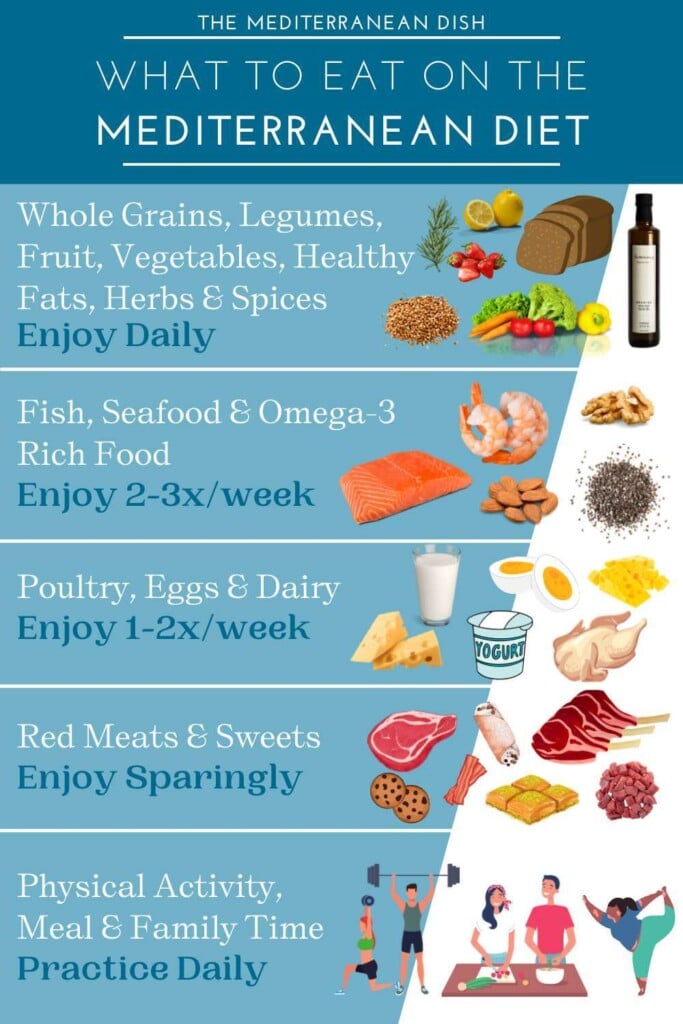The Mediterranean Diet is a research-backed way of life that includes natural daily movement, joyful social living, and a diet rich in healthy fats like olive oil, loads of vegetables and fruits, seafood, nuts, whole grains, and more.

Heart disease is the leading cause of death for both men and women in the United States, accounting for nearly one in every five deaths. The good news? There are many ways to help prevent cardiovascular disease, and one of the first things you can do is focus on what you eat.
Enter the Mediterranean diet—a lifestyle renowned as one of the healthiest ways to support heart health and overall well-being. Consistently ranked as the best overall diet by U.S. News & World Report, it’s backed by decades of research linking it to lower rates of heart disease. Here is a closer look at the impact the Mediterranean diet can have on your heart health.
Research That Revolutionized Heart Health
The Mediterranean Diet originally gained popularity through research by Ancel Keys and his team in the 1960s as part of the Seven Countries Study. Medical researchers noticed that deaths related to cardiovascular disease were lower in countries bordering the Mediterranean Sea than in the United States and Northern Europe.
More recent studies, such as the PREDIMED study, have continued to connect the Mediterranean Diet to reduced risk factors for heart disease, including lower cholesterol levels and blood pressure.
According to the revised study, Primary Prevention of Cardiovascular Disease with a Mediterranean Diet Supplemented with Extra-Virgin Olive Oil or Nuts, “involving persons at high cardiovascular risk, the incidence of major cardiovascular events was lower among those assigned to a Mediterranean diet supplemented with extra-virgin olive oil or nuts than among those assigned to a reduced-fat diet.”

What Makes the Mediterranean Diet Unique?
The Mediterranean Diet is more than just a healthy eating pattern—it is a lifestyle that promotes overall well-being. This eating pattern recognizes that good food alone is not enough. The foundation of the Mediterranean Diet is centered around:
- Fresh, seasonal plant-forward foods: This includes fruits, vegetables, whole grains, and legumes. Antioxidants from colorful fruits and vegetables combat oxidative stress and inflammation. A high fiber intake from whole grains, legumes, fruits, and vegetables helps fight inflammation, lowers cholesterol and blood pressure, and helps regulate blood sugar.
- Healthy fats and protein: Foods such as nuts, lean proteins, fatty fish like salmon, seafood, and, of course, olive oil!
- READ MORE: To learn more about why olive oil is prized in the Mediterranean read one of our guides on how to cook, bake, taste, and learn everything there is to learn about olive oil.
- TRY IT: Each of our olive oils is third-party tested and lists the polyphenol levels (think heart-healthy antioxidants) in the description so you know its quality and value. See for yourself and check out our olive oils from Greece, Italy, California, and Spain.
- Physical activity: In addition to exercise that gets your heart pumping, activities such as gardening and walking are also encouraged. Exercise can reduce the risk of heart disease, stroke, and heart failure. It can also lower blood pressure, reduce bad cholesterol, and increase good cholesterol.
- Occasional indulgence: Red wine and alcohol can also be part of the diet in small amounts. Foods like red meat, those high in saturated fats, and highly processed foods can still be part of the diet but only eaten on occasion.
- Social connections: The Mediterranean perspective on eating includes enjoying meals with others. This helps strengthen relationships, improves mental health, and results in healthier food choices with greater enjoyment of food.

What Makes the Mediterranean Diet Heart Healthy?
Research has suggested that the benefits of the eating pattern come from the combination of all of these components working together rather than any single food or food group. The diet’s health advantages stem from the interconnected effects of its overall eating pattern.
So, what does this mean for you? To truly reap the health benefits, you can’t pick and choose just one or two elements—you need to embrace the whole lifestyle. It’s not just about eating beans or enjoying salmon; it’s about incorporating all the nourishing components that make this diet so powerful.
Easy Tips to Get Started
If you are ready to embrace this amazing lifestyle, here are a few easy ideas to get started:
- Start small: swap olive oil for butter
- Add salad to your meals
- Plan a meatless meal once a week—use vegetables and legumes instead of meat.
- Get moving! Find an activity that you like, such as walking, and do it.
- Plan shared meals at least once or twice a week.
The Mediterranean Diet offers proven heart-health benefits while being a sustainable and enjoyable way to eat. Backed by research, it’s more than a diet—it’s a lifestyle that’s easy to embrace. Start exploring delicious Mediterranean Diet recipes today to make this heart-healthy approach work for you.
Bundle and Save!
Get the flavor party essentials to start your Mediterranean Diet Journey today!

